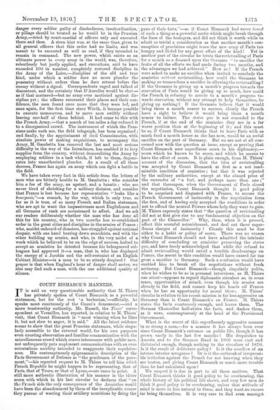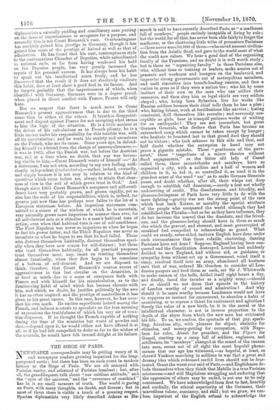COUNT BISMARCK'S MANNERS.
IT is said on very questionable authority that M. Thiers has privately spoken of Count Bismarck as a powerful statesman, but for the rest a barbarian,'—officially, he speaks most courteously of the Count's demeanour,—and a more trustworthy authority, Mr. Russell, the Times' corre- spondent at Versailles, has reported, in relation to M. Thiers' visit, that Count Bismarck is "most winning when he likes it, but not slow to anger, it is said." All the latest evidence seems to show that the great Prussian statesman, while singu- larly accessible to the external world, for his own purposes even courting observation and familiar communication with the miscellaneous crowd which craves intercourse with public men, not unfrequently puts unpleasant communications with an even ostentatious acerbity intended to exaggerate their repulsive- ness. His contemptuously epigrammatic description of the Paris Government of Defence as "the gentlemen of the pave- ment,"—his reported request to M. Thiers to tell him which French Republic he might happen to be representing, that of Paris, that of Tours, or that of Lyons,—are cases in point. A still more authentic illustration of his manner is the bitter scorn with which in his last circular he declares that "on the Franch side the only consequence of the Armistice would have been the abandonment by them of the inexplicable course they pursue of wasting their artillery munitions by firing the guns of their forts,"—as if Count Bismarck had never heard of such a thing as a powerful sortie which might break through the lines of the besiegers, and did not think it worth while to admit so trivial a consideration as that another month's con- sumption of provisions might leave the new army of Paris too hungry and ill-fed for any great effort of the kind Yet in another part of the circular he treats the revictualling of Paris for a month as a demand upon the Germans "to sacrifice the fruits of all the efforts we had made during two months, and the advantages we had achieved." How so ? If the French were asked to make no sacrifice when invited to conclude the armistice without revictualling, how could the Germans be making so tremendous a sacrifice in allowing the revictualling If the Germans in giving up a month's progress towards the starvation of Paris would be giving up so much, how could the French in refusing to accede to a month's progress to- wards starvation, without any attempt to help themselves, be giving up nothing ? If the Germans believe that it would bring them a month nearer to success, clearly the French have a right to believe it would bring them a month nearer to failure. The status quo is not conceded to the French, if at the end of the armistice they are in a far worse position than at the beginning of it ; and this must be so, if Count Bismarck thinks that to leave Paris with as much food a month hence as she has now, would be an awful sacrifice on the part of Germany. But we are not at all con- cerned now with the question at issue, except as proving that Count Bismarck uses superfluous scorn in his diplomacy,— scorn which he knows to be scorn, and which he means to have the effect of scorn. It is plain enough, from M. Thiers' account of the discussion, that the idea of revictualling was accepted by Count Bismarck at first as a not inad- missible condition of armistice ; but that it was rejected by the military authorities, except at the absurd price of the surrender of "a fort, and perhaps more than one ;" and that thereupon, when the Government of Paris closed the negotiation, Count Bismarck thought it good policy to be surprised and disgusted with France, to accuse the French Government of insincerity in the negotiation from the first, and of having only accepted the conditions in order not to offend the neutral Powers whose help they want to gain. M. Thiers expressly states that "the question of revictualling did not at first give rise to any fundamental objection on the part of the Chancellor." Why, then, when it is pressed, affect this scornful astonishment, and deal out these super- fluous charges of insincerity ? Clearly this must be due either to a habit or policy of scorn. There was no reason why Count Bismarck should not have admitted the intrinsic difficulty of concluding an armistice preserving the status quo, and have freely acknowledged that while the refusal to admit revictualling would entail a terrible disadvantage on France, the assent to this condition would have caused far too great a sacrifice to Germany. Such a confession would have enabled him to break off the negotiations without fresh acrimony. But Count Bismarck—though singularly polite, when he wishes to be so in personal interviews, as M. Thiera can attest—appears to regard diplomatic circulars as, in some sense, opportunities of attack, even though his armies are already in the field, and cannot keep his hands off France when he has an opportunity for moral blows. M. There' circular in relation to his recent mission is far less aggressive on Germany than is Count Bismarck's on France. M. Thiers states the facts courteously enough, and leaves them. The German Chancellor half-states the facts, and dashes them, as it were, contemptuously at the head of the Provisional Government.
What is the secret of this superfluously aggressive manner in so strong a man,—for a manner it has always been ever since Count Bismarck's entrance on public life, though it has grown vastly in the last few mouths? His despatches to Austria and to the German Bund in 1866 were curt and dictatorial enough, though nothing to the circulars of 1870- Is it the result of deliberate policy ? Is it the overflow of an intense interior arrogance ? Or is it the outbreak of irrepressi- ble irritation against the French for not knowing when they are beaten, and giving Count Bismarck so much more trouble than he had calculated upon ?
We suspect it is due in part to all these motives. That. Count Bismarck thinks it good policy to be overbearing, the whole history of his political life shows, and .very few men do think it good policy to be overbearing, unless that attitude of mind is more or less natural to them, and they want an excuse for being themselves. It is very rare to find even amongst to feel his power totter, and the Third Napoleon was never so mankind feel compelled to acknowledge as grand. What irresolute as when he began to see that he had failed. Those could we steady, sober-sided, taciturn English have done under who distrust themselves habitually, distrust themselves speci- such circumstances that these volatile, chattering, dancing ally when they have new reason for self-distrust ; but those Parisians have not done ? Suppose, England having been con- who trust themselves habitually, for all practical purposes quered and the Constitution destroyed, London had suddenly trust themselves most, nay, insist on trusting themselves decided to save England, had without aid, or guidance, or almost fanatically, when they first begin to be conscious sympathy from without set up a Government, voted itself a
of a bottom of self-distrust. And we are disposed to camp, resolved itself into an army, abandoned all business think, therefore, that Count Bismarck's wanton excess of save that of war, ordered Mr. Goschen to consider all Lon- aggressiveness in this last circular on the Armistice, is doners paupers and feed them as such, set Sir J. Whitworth at least as much due to a sense of annoyance both with to make cannon of the bells, drilled itself eight hours a day, France and with himself for his miscalculation, as to the and finally, faced the invader as a mighty army,—should domineering habit of mind which has become chronic with we or should we not deem that episode in the history him, and which, no doubt, he justifies politically by the awe of London worthy of record and admiration ? And why it has so often inspired, and the prestige of masterliness it has should it be more worthy because Londoners would not have given to his great career. In this case, however, he has over- to suppress an instinct for amusement, to abandon a habit of shot his own mark. He excites superfluous hatred among the sauntering, or to repress a thirst for excitement and agitation ? French, and induces neutrals to speculate on the true meaning Surely the value of a new birth, be it in the moral or the of expressions the truthfulness of which his very air of vexa- intellectual character, is not in inverse proportion to the tion disproves. If he thought the French capable of nothing depth of the abyss from which the new man has extricated during the time of the armistice but waste of powder and his life. To us, we confess, the spectacle of that gay, spark- shot,—depend upon it, he would either not have offered it at ling, frivolous city, with pleasure for object, absinthe for all, or if he had felt compelled to defer so far to the wishes of stimulus, and money-getting for occupation, with Napo. the neutrals, he would have felt inward delight at its failure. leon for ruler, About for preacher, and the Figaro for



































 Previous page
Previous page